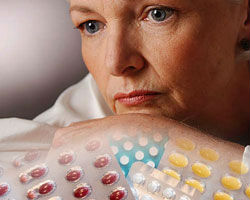Are Women Less Susceptible to Heart Disease?

It is a well-known fact that women tend to live longer than men1. We may ask what is the reason for this? Of course there are many factors at play. One of the main reasons for the longevity of women is something that makes women uniquely women. That 'something' is estrogen, the main female hormone. There is actually a whole group of estrogens, which include: estrone, estradiol, and estriol. Estradiol is the predominant estrogen that circulates within the bloodstream during a woman's reproductive years; estrone is the main estrogen in women experiencing menopause; estriol is the estrogen present during pregnancy.
It is yet unclear which of the estrogens has the most prominent cardioprotective function2. However, the data is clear that estrogens greatly reduce the likelihood of atherosclerosis and normalize the lipid fractions 1,3,4 in premenopausal women, women on estrogen therapy, and even in men who have undergone male to female sex change.
It appears that estrogen causes both short-term and long-term effects on the bodies' blood vessels.
Short-term effects (also known as nongenomic, as they do not involve the alteration of gene expression) include:
- vasodilation (widening of blood vessels) through the release of nitric oxide 5.
- the release of nitric oxide inhibits platelet activation, which lowers the chances of thrombus formation as a response to injury (possibly leading to heart attack or stroke)5.
Long-term effects of estrogen on blood vessels include:
- reduced concentrations of renin 6 and angiotensin-converting enzyme 7, which are responsible for elevation of blood pressure.
- reduction of atherosclerotic processes through stimulation of endothelial growth and inhibition of its apoptosis (programmed cell death). Inhibition of proliferation (growth) of smooth-muscle cells is also a contributing factor for the reduction of atherosclerotic processes.
Long-term systemic effects:
- Antiatherosclerotic effect is achieved through normalization of serum lipoproteins. Many studies, including a large, controlled trial 8, have shown that estrogen therapy reduces low-density lipoprotein and total cholesterol, while increasing serum high-density lipoproteins and triglycerides. A curious discovery was made that showed the transdermal administration of estrogen did not have the same effect on lipid levels as oral administration of estrogen.
- A number of studies 9,10,11 have also shown that administration of estrogen reduces coagulation time, increases fibrinolytic activity, and has a substantial vasoprotective effect.
- Antioxidant activity – estradiol seems to exhibit antioxidant activity; however, other estrogens have a widely differing antioxidant and even pro-oxidant effect.
What does this all mean and how will it help me live a better life?

After reading and understanding all the technical details we’ve provided above, you might be wondering: “How can this help me have a healthier life?” If you’re a man, then this information is useless. However, if you’re a woman, the information is vital to understand the effects of these estrogens.
Not many women choose estrogen replacement therapy upon reaching menopause. Many women are unaware of this therapy and its effects.
It is highly recommended by physicians for women with a high risk of:
- Coronary heart disease
- Osteoporosis
- Parkinsonism
- Anxiety or depression
- Dementia
- Sexual dysfunction
However, the current estrogen replacement therapy is not perfect and should be used only by women who have had a hysterectomy (removal of the uterus). In such cases, only estrogen (without the addition of progestin) can be taken. This is very important since estrogen-progestin replacement therapy, which is prescribed to women who have their uterus intact, increases the risk of breast cancer and heart disease. Moreover, estrogen replacement therapy increases the risk of proliferation of endometrium which may lead to endometrial cancer.
Conclusion
The scientists are still working on identifying the exact type of estrogen that selectively affects the vasculature. If or when they do, humanity will have a brand new type of medicine which can reduce the risk of cardiovascular diseases by 30-50% 1,4. Until then, we have to use what is presently available.
Thus, women experiencing menopause are recommended to undergo a hysterectomy. It may sound frightening but it is greatly advised. Since 2012 in the United States, over 52,000 women were diagnosed with endometrial cancer and over 8,500 have died as a result. This type of cancer very rarely happens before the age of 45 and usually appears in menopausal women.
After a hysterectomy, a woman can commence estrogen replacement therapy without fearing causing an increased risk of breast and uterine cancer. This will not only save them from the common symptoms of menopause, including hot flashes and night sweats, but also reduce the risk of such serious conditions as osteoporosis, heart disease, depression, etc.
References:
1 Barrett-Connor E. Sex differences in coronary heart disease: why are women so superior? The 1995 Ancel Keys Lecture. Circulation 1997;95:252-264
2 Braunwald E. Shattuck Lecture -- cardiovascular medicine at the turn of the millennium: triumphs, concerns, and opportunities.
3 Stampfer MJ, Colditz GA, Willett WC, et al. Postmenopausal estrogen therapy and cardiovascular disease: ten-year follow-up from the Nurses' Health Study. N Engl J Med 1991;325:756-762
4 Grady D, Rubin SM, Petitti DB, et al. Hormone therapy to prevent disease and prolong life in postmenopausal women. Ann Intern Med 1992;117:1016-1037
5 Moncada S, Higgs A. The l-arginine-nitric oxide pathway. N Engl J Med 1993;329:2002-2012
6 Schunkert H, Danser AHJ, Hense HW, Derkx FHM, Kurzinger S, Riegger GAJ. Effects of estrogen replacement therapy on the renin-angiotensin system in postmenopausal women. Circulation 1997;95:39-45
7 Proudler AJ, Ahmed AI, Crook D, Fogelman I, Rymer JM, Stevenson JC. Hormone replacement therapy and serum angiotensin-converting-enzyme activity in postmenopausal women. Lancet 1995;346:89-90
8 The Writing Group for the PEPI Trial. Effects of estrogen or estrogen/progestin regimens on heart disease risk factors in postmenopausal women: the Postmenopausal Estrogen/Progestin Interventions (PEPI) Trial. JAMA 1995;273:199-208[Erratum, JAMA 1995;274:1676.]
9 Nabulsi AA, Folsom AR, White A, et al. Association of hormone-replacement therapy with various cardiovascular risk factors in postmenopausal women. N Engl J Med 1993;328:1069-1075
10 The Writing Group for the Estradiol Clotting Factors Study. Effects on haemostasis of hormone replacement therapy with transdermal estradiol and oral sequential medroxyprogesterone acetate: a one-year, double-blind, placebo-controlled study. Thromb Haemost 1996;75:476-480
11 Salomaa V, Rasi V, Pekkanen J, et al. Association of hormone replacement therapy with hemostatic and other cardiovascular risk factors: the FINRISK Hemostasis Study. Arterioscler Thromb Vasc Biol 1995;15:1549-1555









